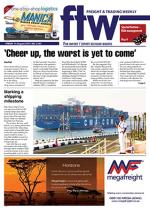Government’s proposed
carbon tax – due for
implementation in July
next year – will result in
one of the biggest tax rate
increases in South Africa,
economist Mike Schussler
said last week.
“Other than the three
big taxes – personal income
tax, company taxes and
value-added tax (VAT) –
the only other tax likely to
be bigger, at least at the
lower carbon tax rate, is
fuel tax.”
Schussler believes
government should be
looking at the economic,
environmental and social
impact of regulations and
new taxes before they are
introduced.
Speaking at the Special
Interest Group (SIG)
Transport Forum in
Johannesburg last week,
Schussler expressed
concern that new
regulations –
including the recent
truck banning proposal
and the carbon tax – would
cut into South Africa’s
gross domestic product
(GDP) margins and
considerably add to already
high logistics costs.
He says the logistics
industry already operates
on only a 4% profit margin.
“Certain regulations,
including those mentioned,
would simply force more
trucks on the road to
cope with constrained
conditions,” said Schussler.
He points out that SA
has a very high tax to GDP
ratio. “This is not just a
function of inequality
but also a result of high
taxation levels.” The
current world average is
14.4%, with South Africa
recording almost double
that at 27%, according
to latest statistics by
Schussler’s company,
Economists.co.za.
He
commented
that the
current
carbon tax would not be
ring-fenced and would thus
go into general Treasury
coffers. “It is therefore not
too much of a stretch to
say the additional revenue
would not be spent on
improving road or other
logistics operational
efficiencies but rather on
increased public servant
salaries which continue to
escalate,” said Schussler.
In a cost-conscious
environment, adding
another tax may just
kill the goose that
lays the golden egg.
– Mark Schussler

